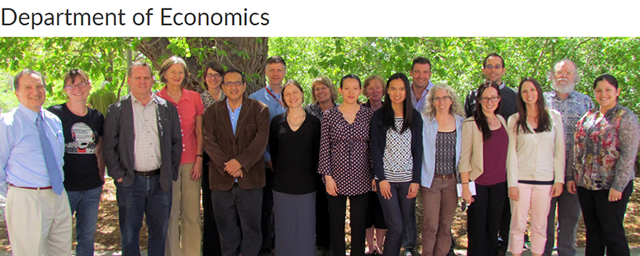
Economics ETDs
Publication Date
9-12-2014
Abstract
This dissertation studies the relationship between environmental attitudes and National Forest management in the Southwest, specifically the effect that attitudes have on changes to recreation fees. Although there is research on the effect of environmental attitudes on willingness-to-pay for environmental goods (e.g., Spash 2000; Spash 2006; Ojea and Loureiro 2007), little work has been done on analyzing the effect that environmental attitudes have on changes to recreation fees. I help address this gap by investigating the effects that public land values, a measure of environmental attitudes, have on changes to recreation fees at National Forests using primary data from a general population survey of households in the Southwestern region of the United States. In the face of reduced budget appropriations, recreation fees represent a vital source of additional funding that helps cover the short-fall in financial resources. For public land agencies, the ability to fund maintenance of ecosystem service benefits through recreation fees is an important aspect of management plans. Of critical significance for this dissertation is the acknowledgement by public land agencies of the importance of environmental values and attitudes in shaping socially acceptable policies that affect ecosystem services. I begin by using canonical correlation analysis, a multivariate analysis method that makes no a priori assumptions on the direction of causality, to identify and describe environmental attitudinal groups in the sample. Results show that agencies must realize that environmental values and attitudes often contradict the conventional wisdom of a clear demarcation within segments of the population, e.g., not all women have pro-environmental attitudes, or Hispanics hold weaker environmental attitudes relative to other groups. I then measure the effect that environmental attitudes have on accepting an increase in recreation fees and a new fee to support public lands. The effect of the environmental attitudes is to moderate the support, or rejection, to changes in recreation fees, impacting how resource management may be funded. Finally, I estimate the impact on recreation demand from changes in recreation fees using a corner solution travel cost model. Four changes in recreation fees are analyzed, including dropping all fees due to not renewing the current fee legislation, which is set to expire in 2014, and switching to a flat fee at recreation sites that are currently charging a fee. As would be expected, higher recreation fees will reduce recreation demand to National Forests, but what is unexpected is the negligible effect on demand from switching to a flat fee. Introducing fees on eligible sites not currently charging is likely to have a slightly negative effect on recreation to National Forests in the Southwest. The planning process must seek public input and an analysis of environmental attitudes to ensure regional and local plans reflect the concerns of public and important stakeholder groups. Policymakers must consider conservation efforts in the short-run and limited resource development over the long-run. In terms of public input, planners should involve stakeholder groups in the process, as they play an important role in signaling how strongly people feel about the environment and the likely direction of support for policy based on their underlying environmental values and attitudes.
Degree Name
Economics
Level of Degree
Doctoral
Department Name
Department of Economics
First Committee Member (Chair)
Grimsrud, Kristine
Second Committee Member
Berrens, Robert
Third Committee Member
Zandbergen, Paul
Fourth Committee Member
McCollum, Dan
Project Sponsors
U.S. Forest Service
Language
English
Keywords
Environmental Attitudes, National Forests and Grasslands, Recreation Demand, Southwest
Document Type
Dissertation
Recommended Citation
Prera, Alejandro. "How do the Public's Environmental Attitudes affect Recreation Demand for National Forests and Grassland in the Southwest?." (2014). https://digitalrepository.unm.edu/econ_etds/17
